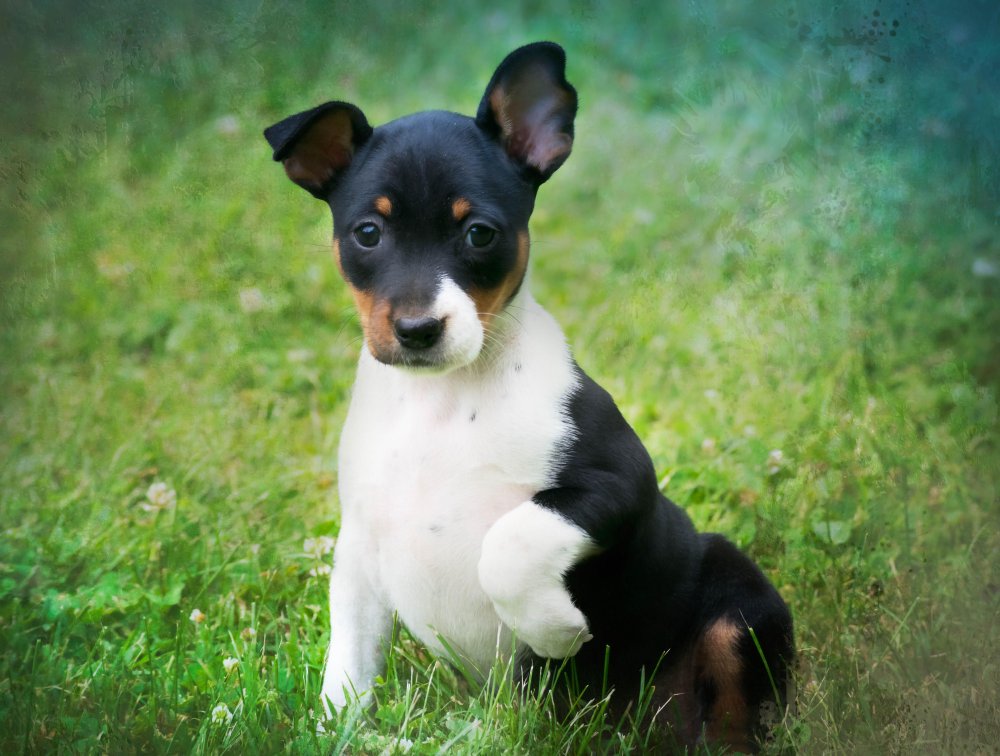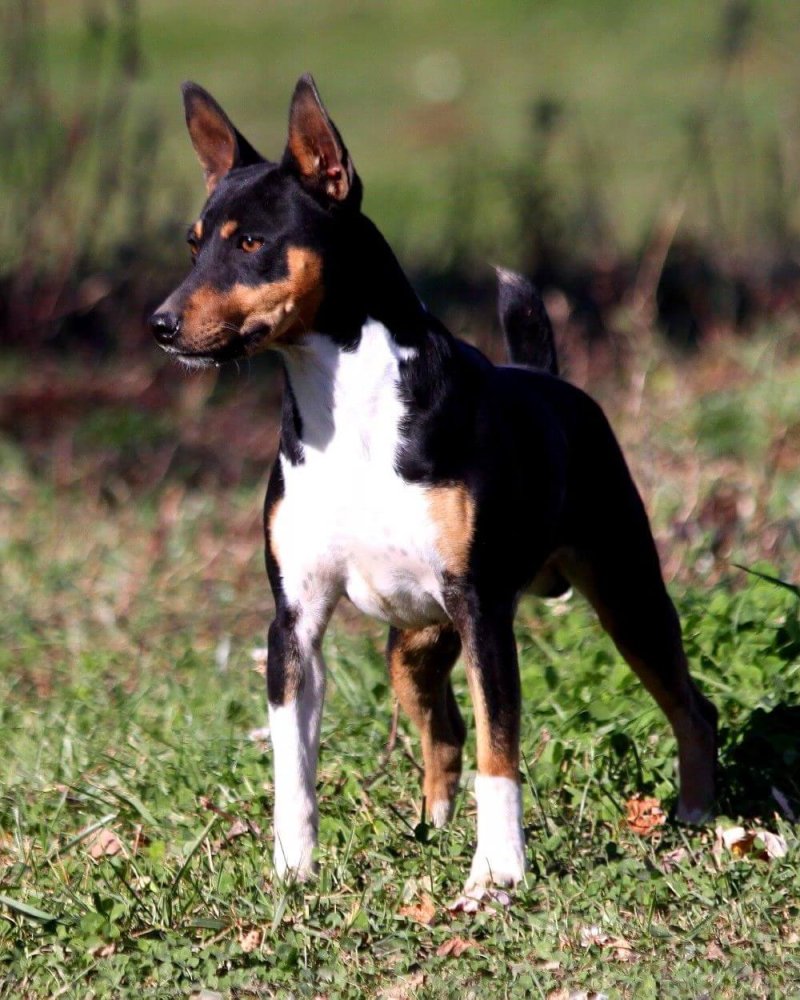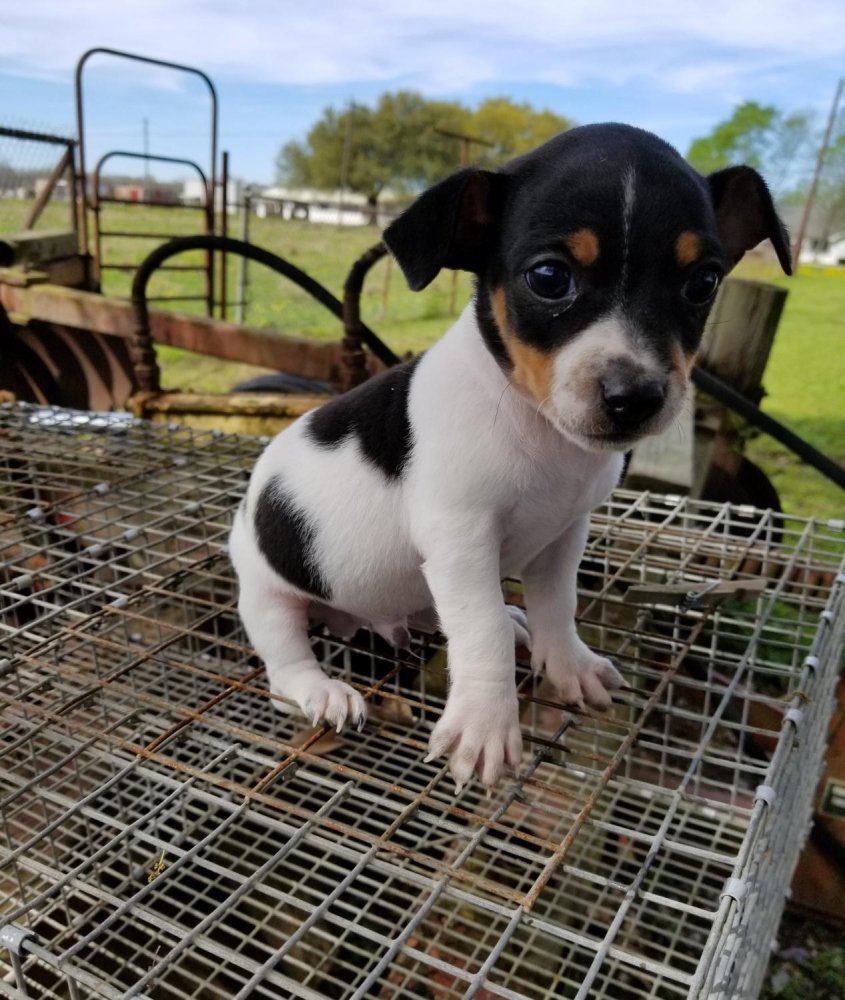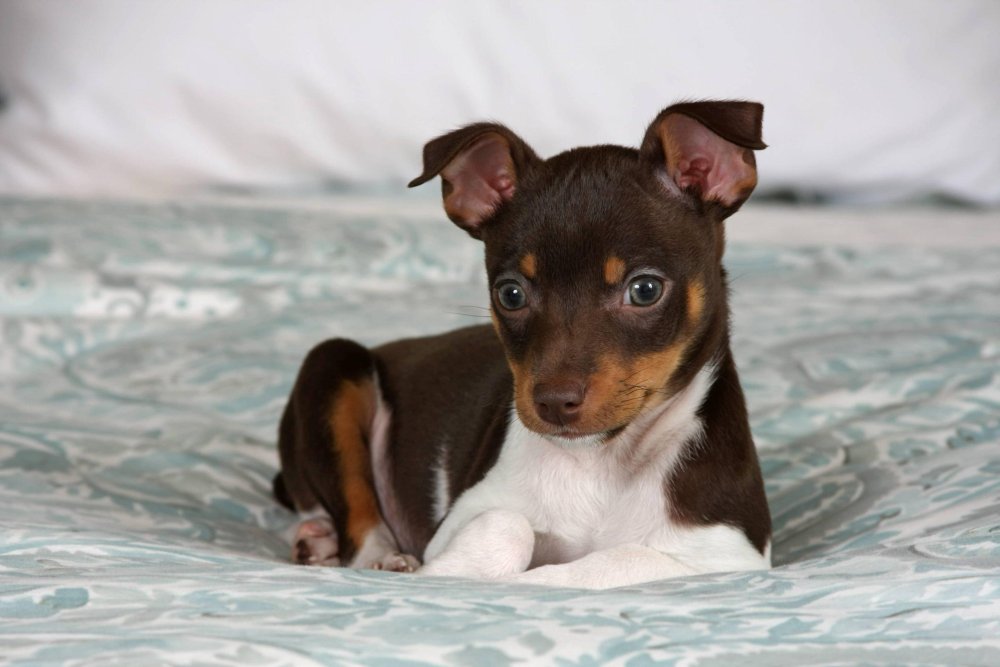- Breed Category: Terrier
- Country of Origin: United States
- Average Height: 25-46 cm (10-18 inches)
- Average Weight: 4.5-11 kg (10-25 pounds)
- Average Life Span: 12-18 years
- Grooming Requirements: Low, occasional brushing
- Exercise Requirements: High, daily exercise needed
- Coat Type: Short, smooth
- Coat Color Variations: Black, white, tan, tri-colour
- Shedding Level: Moderate
- Ear Type: Erect or semi-erect
- Tail Type: Naturally bobbed or docked
- Temperament: Energetic, intelligent, loyal
- Intelligence Level: High
- Barking Tendency: Moderate to high
- Compatibility with Children: Good with proper socialisation
- Compatibility with Other Pets: Generally good, may chase small animals
- Training Ease: Relatively easy, eager to please
- Common Health Issues: Hip dysplasia, allergies
- Dietary Needs: High-quality dog food, portion control
- Energy Level: Very high
- Drooling Tendency: Low
- Sensitivity to Weather: Sensitive to cold
- Overall Maintenance Level: Low to moderate
- Original Purpose: Hunting and farm work
- Year of Recognition by Kennel Clubs: 2013 (AKC)
- Apartment Friendly: Yes, with sufficient exercise
- Best Suited For: Active families, rural or urban living
- Cost of Ownership: Moderate
- Unique Traits: Excellent vermin hunters
- Popularity Rank: Growing in popularity
Did you know that Rat Terriers can jump up to five times their height? This little powerhouse of a breed is full of surprises. Originating in the United States, Rat Terriers were bred for their agility and hunting prowess, making them excellent farm dogs. They’re small, but don’t let their size fool you—they’re packed with energy and intelligence. This article will dive into the unique characteristics that make Rat Terriers stand out, explore their rich history, and offer insights into their care. Whether you’re considering adding one to your family or just curious about this spirited breed, you’ll find everything you need to know right here.
History and Origin

Early Development of the Breed
Rat Terriers have a fascinating history that dates back to the early 20th century in the United States. They were developed by crossing a variety of terriers, including the Fox Terrier, Bull Terrier, and Manchester Terrier, among others. This mix was designed to create a versatile dog that could handle a range of tasks on the farm. Their small size and quick reflexes made them perfect for hunting small game and controlling vermin populations.
Role in American Farming and Hunting
On American farms, Rat Terriers quickly became indispensable. They were not just hunters but also loyal companions to farmers. Their keen sense of smell and boundless energy made them excellent at tracking and catching pests. In addition to their hunting skills, they were valued for their ability to adapt to various farm duties, showcasing their intelligence and versatility.
Key Historical Figures Involved in the Breed’s Creation
One notable figure in the development of the Rat Terrier was President Theodore Roosevelt. He was a fan of the breed and even credited his Rat Terrier with ridding the White House of a rat infestation. His endorsement helped popularise the breed, cementing its place in American history as a beloved and hardworking dog.
Physical Characteristics

Appearance
Rat Terriers are small but mighty, typically weighing between 4 to 11 kilograms and standing about 25 to 46 centimetres tall. Their coat is short and smooth, coming in a variety of colours like black, chocolate, red, and blue, often with white markings. Some even sport unique spots or patches, adding to their charming appearance. Their ears can be erect or semi-erect, giving them an alert and lively expression.
Unique Physical Traits
One of the standout features of the Rat Terrier is their agile and compact build. This breed is known for its incredible jumping ability, often surprising owners with their athletic prowess. Their muscular body and strong legs make them excellent runners and jumpers, perfect for chasing after small game or simply enjoying a playful romp in the backyard. Despite their small size, they carry themselves with a confident and spirited demeanour, always ready for the next adventure.
Temperament and Behaviour

Typical Personality Traits
Rat Terriers are known for their loyalty and intelligence. They form strong bonds with their families and are always eager to please. Their sharp minds make them quick learners, which is great for training. These dogs are energetic and love to stay active, so they thrive in environments where they can run and play.
Suitability as a Family Pet and Working Dog
As family pets, Rat Terriers are a fantastic choice. They’re affectionate and enjoy being part of family activities. Their working dog roots mean they’re also excellent at tasks that require focus and determination. Whether it’s helping out on a farm or participating in dog sports, they’re up for the challenge.
Interaction with Children and Other Animals
Rat Terriers generally get along well with children, especially if they’re raised together. They’re playful and patient, making them great companions for kids. With other animals, early socialisation is key. They can coexist peacefully with other pets if introduced properly, though their hunting instincts might kick in with smaller animals.
Training and Exercise Needs

Importance of Early Training and Socialisation
Getting a head start on training and socialisation is crucial for Rat Terriers. These dogs are smart and eager to learn, but they can also be a bit stubborn. Early training helps channel their energy and intelligence in the right direction. Socialising them with different people, pets, and environments from a young age ensures they grow up to be well-rounded and confident.
Recommended Training Techniques
Positive reinforcement is the way to go with Rat Terriers. They respond well to treats, praise, and playtime as rewards. Keep training sessions short and fun to hold their attention. Consistency is key, so make sure everyone in the household is on the same page with commands and rules.
Daily Exercise Requirements and Activities They Enjoy
Rat Terriers are bundles of energy, so they need plenty of exercise to stay happy and healthy. Aim for at least an hour of physical activity each day. They love activities like fetch, agility courses, and long walks. Mental stimulation is just as important, so puzzle toys and interactive games are great for keeping their minds sharp.
Health and Lifespan
Common Health Issues
Rat Terriers are generally healthy, but like any breed, they can be prone to certain health issues. Some common concerns include hip dysplasia, patellar luxation, and allergies. Regular vet check-ups can help catch these issues early. Keeping an eye on their weight is also important, as obesity can exacerbate joint problems.
Average Lifespan and Tips for Keeping Them Healthy
With proper care, Rat Terriers typically live between 12 to 18 years. To ensure they reach their golden years in good health, provide a balanced diet and regular exercise. Mental stimulation is just as crucial, so engage them with interactive toys and training sessions. Regular grooming, including dental care, will also contribute to their overall well-being.
Preventative Care Recommendations
- Schedule annual vet visits for vaccinations and health screenings.
- Maintain a consistent flea and tick prevention routine.
- Brush their teeth regularly to prevent dental issues.
- Monitor their diet to prevent obesity and related health problems.
- Ensure they get plenty of physical and mental exercise daily.
Grooming and Maintenance
Coat Care and Grooming Routines
Rat Terriers have a short, smooth coat that’s relatively low-maintenance. Regular brushing, about once a week, will keep their coat looking its best and help distribute natural oils. A soft-bristle brush or grooming mitt works well for this breed. Bathing is only necessary when they get particularly dirty or start to smell, as over-bathing can strip their coat of essential oils.
Shedding and Seasonal Grooming Tips
While Rat Terriers are not heavy shedders, they do experience some seasonal shedding, particularly in spring and autumn. During these times, you might want to increase brushing to a couple of times a week to manage loose hair. This not only keeps your home cleaner but also helps your dog feel more comfortable. Regular grooming sessions are a great opportunity to check for any skin issues or parasites, ensuring your Rat Terrier stays healthy and happy.
Diet and Nutrition

Nutritional Needs for Optimal Health
Rat Terriers are active little dogs, so they need a diet that supports their energy levels. A balanced diet rich in high-quality proteins, healthy fats, and essential vitamins and minerals is key. Look for dog foods that list meat as the first ingredient and avoid those with excessive fillers like corn or soy.
Foods to Include and Avoid
Include lean meats, fish, and vegetables in their diet. These provide the necessary nutrients for muscle development and overall health. Avoid foods high in artificial preservatives, colours, and flavours. Also, steer clear of giving them chocolate, grapes, or onions, as these can be toxic to dogs.
Feeding Schedules and Portion Recommendations
Establishing a regular feeding schedule helps maintain their energy and weight. Typically, two meals a day—morning and evening—works well for adult Rat Terriers. Puppies may need three smaller meals. Portion sizes depend on their age, weight, and activity level, so consult your vet for tailored advice. Always ensure fresh water is available.
Fun Facts and Trivia

Interesting Tidbits About the Breed
Rat Terriers are full of surprises. Did you know they were once a favourite among American farmers for their pest control skills? Their name comes from their exceptional ability to catch rats and other small vermin. These dogs are not just about work, though. They have a playful side and love to entertain their families with their antics. Their intelligence and agility make them excellent candidates for dog sports like agility and obedience trials.
Famous Rat Terriers in Media or History
One of the most famous Rat Terriers was President Theodore Roosevelt’s dog, who reportedly cleared the White House of a rat infestation. This little hero helped boost the breed’s popularity in the early 20th century. In more recent times, Rat Terriers have made appearances in movies and TV shows, often cast for their lively and spirited nature. Their unique look and energetic personality make them a standout choice for the screen.
Final Thoughts
Rat Terriers are dynamic, intelligent companions with a rich history. Their blend of energy and loyalty makes them ideal for active families and individuals. While they require consistent training and exercise, the rewards of their companionship are immense. From their origins as farm dogs to their role as beloved pets, Rat Terriers continue to capture hearts with their spirited nature. Consider welcoming a Rat Terrier into your home and experience the joy they bring firsthand.
